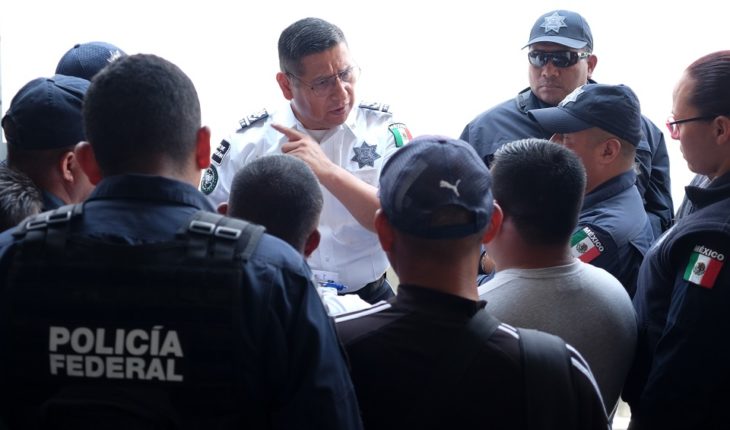The crisis over the disappearance of the Federal Police (PF) reached the National Commission on Human Rights (CNDH). A group of agents filed a formal complaint with that body, alerting them to multiple violations of their individual guarantees: from discriminatory treatment, legal insecurity, to work uncertainty.
In the complaint, the authorities of three units are responsible for these irregularities: the Federal Police itself, the Ministry of Security and Citizen Protection, and the Ministry of National Defense.
The complaint was filed after two weeks of demonstrations by the agents, for the conditions under which the government has operated the transition from this corporation to the National Guard.
After several negotiating tables, the federal government has proposed that the dissatisfied go to other units, and even pay them a settlement if they do not want to continue in public service.
Read: Lack of uniforms, poor conditions and low benefits, the causes of the protest of federal police
But the legal representative of the disgruntled federal police, Reyna Velasco, warned that this is, at best, a temporary and insufficient solution to cover a reality: that more than 30,000 people are losing their source of work, without having a well-crafted and unimprovised plan for two of them.
“At the moment we are only talking about a division, which is the one that has openly opposed the transfer to the National Guard, but remember that the PF has other divisions and that the transfer as the law itself mark it, will be done gradually , then what will happen to the divisions that follow? There is no certainty of the process so it is essential that the CNDH intervenes,” Velasco said in an interview.
Violations, according to the complaint
In the 12-page complaint, lodged with the CNDH Officers’s Office of Parties, the actors concerned detail the difficult conditions they have suffered this year, and particularly in recent weeks, since the National Guard Act was passed that orders the transfer to it of the entire Federal Police structure.
Read: From detention of migrants to espionage: This is what the National Guard will be able to do
According to the agents, the situations they have suffered are divided into three major areas of rape. The following are the key arguments for each:
Violation of the right to equality and non-discrimination
The police men argue that even though the National Guard is of a civil nature, the condition in which they are tried to incorporate is far from the procedure being carried out with the military and naval police, who are also being incorporated.
They indicated that while federal police have been forced to take a course they already know, and to be subjected to trust control processes, the military has been given a virtually automatic pass by the National Guard, despite their no training in poly which shows that there is no equal circumstance.
“This visible inequality in our cases is compounded by the fact that we did medical and physical examinations in military and military installations, even though the National Guard is supposed to be a purely civil institution, with functions police,” officers say.
In that context, they argue that it is the federal policemen who met the required profile best, as they are already civilian police, while the military is not. In fact, the feds already have the unique Police Certificate required for the Guard. Despite all that, the treatment of the military has been preferential, they accuse.
“For the above, this CNDH should note that we were discriminated against when starting the procedure of transition to National Guard,” the police said.
Violations of legal security, legality and due process rights
Federal agents counter that the procedures implemented for the transition to the Guard have been arbitrary and unjustified, as the law passed in the matter envisaged the direct incorporation of the elements.
Instead, they say, evaluation formats and requirements have been invented without at least proper oversight and civil control. These procedures have determined that many federal police officers are unfit to go to the Guard, although they are insisted to have all the requirements to serve as police officers.
“In fact, the way we participated in that we were not fit was loudly, because of the castrenus elements that subjected us to the tests, even though such officials have nothing to do with our institution, nor are they entitled to do so, nor is there any any regulation that so provides,” the agents note.
Added to this is the alleged promise of liquidations for federal police officers who prefer to resign and which, according to the officers, is not actually legal. This, since according to the Constitution and the law, police officers are not considered workers but public servants, so a voluntary waiver would not give effect to any liquidation.
“To trust then that there would be a liquidation is to believe in a promise of speech but without legal support,” the agents’ legal representative said.
Violation of health protection
The complaint highlights an even more complicated condition for elements of the Federal Police who have some form of motor disability status. In addition to the above rights, they are also being violated their right to health, as it is not guaranteed that they will be able to continue their work in any special area, as if it were done in the Federal Police.
“At this time of transition to the National Guard there are no social guarantees that guarantee their health protection, and the mere mention that they want to put them to various studies and that the administrative security in which they were , contingent on your mood. Protocols should be established to ensure job stability and therefore health for agents in their condition,” the complaint document says.
PF, no money to deliver on what it promises
Reyna Velasco, the officers’ legal representative, warned that federal authorities are acting on the march to resolve the crisis in the Federal Police, with solutions that are unsubstantiated or that, in all, give no guarantee of being credible.
Proof of this is the alleged intention to pay finiquitos to all agents who prefer to withdraw from public service.
“Remember that the PF said it has no money, so if you give up because you don’t want to go to the National Guard or another unit, how will you be sure that you will effectively be given a settlement, if they have not been able to meet the payment obligations arising from judicial proceedings,” she said.
Political Animal has documented that the Federal Police are in fact confronting deeds that it cannot afford. This year reported debts of 2.5 billion pesos arising from various concepts, including compensation from police officers who were illegally dismissed in previous years.
In this context, the lawyer considered it urgent that the CNDH should be involved in the case, that precautionary measures are issued and that a recommendation could be generated that safeguards the position of federal police, who are now in a clear state of helplessness they are not responsible for.
“Let us remember that while police officers constitutionally are under an exception, so are human rights not exclusive, and that from that perspective it must be recognized that their rights are violated (…) it must ensure that the transfer of the elements of PF will be carried out in a context of equality, respect for their labour rights”, decent and indiscriminate treatment.
On Thursday, about a hundred of the dissenting police men demonstrated at the CNDH facility, to accompany the start of the complaint and denounce the situation they have suffered in recent months. The complaint of the agents was granted in the Commission and a visitor will be turned over for analysis.
A few days ago the National Commission on Human Rights ruled on the issue of National Guard to announce the filing of challenges against its law, so they consider to be omissions and risks of violations of individual guarantees. This spawned the annoyance of President Andrés Manuel López Obrador, who even accused the CNDH of having no “moral authority” to discuss the case.
What we do in Animal Político requires professional journalists, teamwork, dialogue with readers and something very important: independence. You can help us keep going. Be part of the team.
Subscribe to Animal Politician, receive benefits and support free journalism.#YoSoyAnimal
translated from Spanish: Federal police complaints to CNDH
July 12, 2019 |





